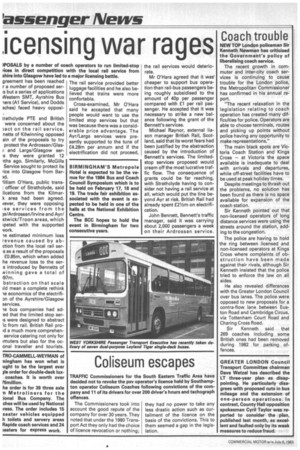icensing war rages
Page 18

If you've noticed an error in this article please click here to report it so we can fix it.
)POSALS by a number of coach operators to run limited-stop 'ices in direct competition with the local rail service from shire into Glasgow have led to a major licensing battle.
greement has been reached
r a number of proposed set s but a series of applications Nestern SMT, Ayrshire Bus iers (Al Service), and Dodds 3ches) faced heavy opposi
trathclyde PTE and British were concerned about the )act on the rail service, netts of Kilwinning opposed am n of the proposals to try protect the Ardrossan/Glas, and Largs/Glasgow sers they were granted 12 iths ago. Similarly, McGills Service sought to protect its rice into Glasgow from Bar3d.
filliam O'Hara, public trans: officer of Strathclyde, said lications from the Kiln-lark area had been agreed. vever, they were opposing
■ se services from the Is/Ardrossan/Irvine and Ayr/ stwick/Troon areas, which ipeted with the supported vork.
le estimated minimum loss revenue caused by abction from the local rail sers as a result of the proposals £0.85m, which when added he revenue loss to the sers introduced by Bennetts of Ninning gave a total of 197m.
bstraction on that scale iId mean a complete rethink le economics of the electrifiNI of the Ayrshire/Glasgow services.
le bus companies had aded that the limited stop ser!s were designed to abstract 'ic from rail. British Rail pro d a much more comprehenservice catering not only for imuters but also for the oconal traveller and tourists. The rail service provided better luggage facilities and he also believed that trains were more confortable.
Cross-examined, Mr O'Hara said he accepted that many people would want to use the limited stop services but that was because there was a considerable price advantage. The Ayr/Largs services were presently supported to the tune of £4.28m per annum and if the electrification did not proceed, the rail services would deteriorate. rate.
Mr O'Hara agreed that it was cheaper to support bus operation than rail-bus passengers being roughly subsidised to the amount of 40p per passenger compared with £1 per rail passenger. He accepted that it was necessary to strike a new balance following the grant of the Bennett's services.
Michael Raynor, external liason manager British Rail, Scotland, said that its worst fears had been justified by the abstraction caused by the introduction of Bennett's services. The limitedstop services proposed would cream off the most lucrative traffic flow. The consequence of grants could be far reaching, with Strathclyde having to consider not having a rail service at all, which would put the line beyond Ayr at risk. British Rail had already spent £21/2m on electrification.
John Bennett, Bennett's traffic manager, said it was carrying about 2,000 passengers a week on their Ardrossan service.




















































































